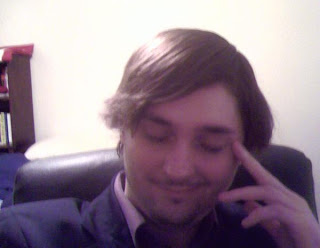But if anyone's reading, let's get a dialog going (sorry about the verb choice, corporatespeak may be tainting my vocabulary) about this tidbit from J-Franz:
Joyce seems like a central figure in this debate, since he went from the "Dubliners" stories, which are, at the level of language, perfectly transparent to average readers, to "Ulysses" and beyond. How much are other writers still affected by his example?
Once you bring in "Ulysses," you invite a discussion like one you might find in some endless thread online—people sounding off angrily on one side and the other, everybody losing their head. I'm personally not a great fan of "Ulysses"—to me, the book feels like some big, chilly Old World cathedral stuffed with iconography, with tourists walking through it quickly, and devotees consulting with the priestly critics who comprehend its Mysteries, and the whole edifice certified by the state and by scholars as Great Art. But the problem is not so much the difficulty of the book itself as the particular status the book has acquired. I mean, it's now our leading model of a work of great literature. It's the iconic modern text; it routinely tops lists of the best novels of the twentieth century—which sends this message to the common reader: Literature is horribly hard to read. And this message to the aspiring young writer: Extreme difficulty is the way to earn respect. This is fucked up. It's particularly fucked up in an era when the printed word is fighting other media for its very life. If somebody is thinking of investing fifteen or twenty hours in reading a book of mine—fifteen or twenty hours that could be spent at the movies, or online, or in an extreme-sports environment—the last thing I want to do is punish them with needless difficulty.
Now, there are some good points here I think (and I admit to liking to the point of jealousy the Ulysses-as-Olde-World-cathedral metaphor) but I rankle at the idea that literature should "dumb down" in order to compete with other media.
The point of contention here centers around just what "needless difficulty" is I think. Are the alternating naratives in Richard Powers' "Plowing the Dark" needlessly difficult? Are the numerous art history references? Or could it be simply a content issue? Are the graphic accounts of murder in American Psycho more difficult than a toned-down version would be?
I think it should be up to the readers, and so long as talented writers can still "make it" I think all this "competing with tv and the internet" talk is bullshit of a high caliber. I enjoy a good novel or short story usally because I can't find anything close to it in any other medium.
I can't think of a single thing on the internet or tv that can compete with being curled up in bed, with some good music (say, Rachmaninoff...or maybe some Explosions in the Sky), Infinite Jest open, my two bookmarks at hand, truly enjoying every second (exception: if the bed was shared with a girl also reading IJ with me...but that may be one of those truly impossible fantasies).
For tomorrow (or so): Literary celebrity--what's it mean to you?

No comments:
Post a Comment